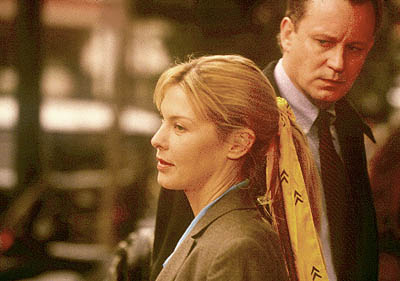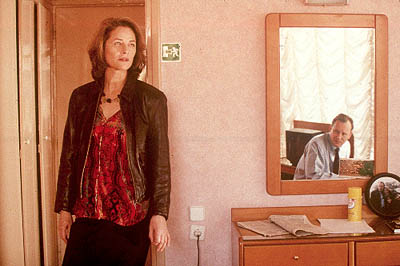

To most people, Lewis Carroll's Through the Looking-Glass evokes images of childlike fantasy, which makes its use in Signs and Wonders even more ambitious. The references work on many levels, from a father reading the book to his daughter, to a crucial plot point, and the fantasy world that Alec Fenton (Stellan Skarsgard, Dancer in the Dark, Timecode) lives in. Alec is an American expatriate living in Greece with his family. Because he cannot speak the language (his wife is Greek and his children are bilingual), it is safe to assume he feels a profound sense of isolation. He has an affair with Katherine (Deborah Kara Unger, The Hurricane, Sunshine), another American, but ends it and wants to reconcile with his wife Marjorie (Charlotte Rampling, Aberdeen, Under the Sand).
Marjorie wants little to do with him. If not for her desire for their children to have a father, it is likely that she would shut him out forever. She is also seriously dating Andreas (Dimitri Katalifos, Safe Sex, It's A Long Road). Alec ignores all of this. He has a hopeless dream that he clings to, that he, Marjorie and their children will again be a family. After mistakenly recording an argument between himself and Marjorie, he replays minor snippets of their argument, using phrases out of context to justify how he thinks she feels about him. Writer/director Jonathan Nossiter (Searching for Arthur, Sunday) and co-writer James Lasdun (Sunday, Beseiged) craft a complex and at times engrossing story of a man trying to find some meaning in his life.
Alec relies heavily on chance and coincidence. He will make decisions based on the number of sewer grates or covered cars he passes. He looks for meaning in all the objects around him. It was his reliance on these signs that caused him to end his affair, begin it, then end it again. Alec tries to spin anything he sees positively in terms of his crumbling relationship with Marjorie. It is his way of avoiding difficult decisions. The people around him recognize this, and use this against him. Skarsgard is a good actor, and easily maneuvers between sadness and maniacal optimism as Alec. He seems to sometimes realize how hopeless his situation is, but then quickly brushes it aside and lapses back into his fantasy.
Mirrors, glass, and keys are a recurring motif in Signs and Wonders. Nossiter places the camera behind windowpanes, as if the viewer was spying on the action. Mirrors are everywhere. The camera will be on one of the actors, and another actor's reflection will be on screen. At certain points, it is difficult to tell whether or not what is happening is real, or a complete figment of Alec's imagination. It is a nice touch, and can represent any number of things. Mirrors can signify the dual nature of the characters, both the duplicitous and the wistful. It also represents the way Alec views his unreality through his own looking-glass.